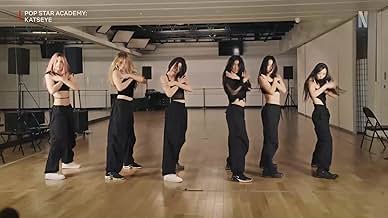CALIFICACIÓN DE IMDb
6.7/10
1.3 k
TU CALIFICACIÓN
Veinte aspirantes a estrellas del pop se someten a un programa de formación en K-pop en esta serie documental sobre la creación del primer grupo femenino global de HYBE x Geffen, KATSEYE.Veinte aspirantes a estrellas del pop se someten a un programa de formación en K-pop en esta serie documental sobre la creación del primer grupo femenino global de HYBE x Geffen, KATSEYE.Veinte aspirantes a estrellas del pop se someten a un programa de formación en K-pop en esta serie documental sobre la creación del primer grupo femenino global de HYBE x Geffen, KATSEYE.
Explorar episodios
6.71.2K
1
2
3
4
5
6
7
8
9
10
Opiniones destacadas
unpleasant programme
I watched this to the end but by then it left me feeling very unsettled because of how the girls were kept in the dark about the end result of all the work they put in. If they had known at the outset that this was nothing but a reality show and only 6 would get through, they may have decided not to do it. The way they were eliminated was cruel in the extreme and such an unkind way to treat young girls. The woman in charge was almost laughing about this - as long as the punters get to see something dramatic, that's all that matters. And in the real world Mannon would have been booted out, although clearly someone at the top loved her because you could see that she wasn't going anywhere, however badly she sang or danced.
Competitive Popstar Competition
Redundant title, but that's the point. Watch it if you like reality tv, competition shows, cliffhangers, and twists.
The show has a very unique perspective. I came into the show after I discovered Katseye. I personally loved building a deeper appreciation for the newly formed group.
Some aspects were slow. The competition itself does not start until episode 5, and the first 4 episodes consist of the training before the competition starts. This makes you build a connection with the girls that have been there at the beginning of the bootcamp.
I've only watched singing competitions; I like this more. It takes a lot of dedication and hard work to be in a girl group and this shows that hard work. The show also displays how dedication and hard work are the basics. There are 5 categories to consider such as Dancing, Singing, and Star Quality. This becomes more prevalent when the girls start to compete against each other. Unfortunately, the girls don't really understand until the competition really starts.
Is it cruel? Maybe, but the audience needs to decide it for themselves. The twists may push some girls over the edge. I was on the edge of my seat due to twists and cliffhangers. Despite knowing who makes the group I did have the occasional trainee that I was secretly rooting for. You'll never see the twists coming.
Just like any competition/reality show, there's gonna be drama. It's easy to pick a side but every result has an underlying reason.
Overall: I liked the perspective and execution of the show. In the end, despite already knowing the results, I was crying for one of my favs that didn't get in. It really takes you through all of the emotions and perspectives, so if you feel a certain way then this show did its thing. I wasn't planning on crying but the music and timing really had me crying then happy for all of my favorites. If I could rank on making me feel something alone it would be a 10/10. However, the show is slow. I think it's valid to criticize the show for not telling the trainees it was as a competition show until the 5th episode. Then I go back to loving how intentional every aspect of the show was. I really only removed 1 star because I wish episode 1 started with the competition versus the very beginning of this training bootcamp. The title of the show is accurate, but I wish it was just "PopStar Competition". Or, "Popstar Academy to Competition", which is wordy but is more accurate to the show. Instead it focused on the origins on Katseye. It's easy to be confused by the rules for each mission but I recommend making sure you understand the rules before watching the elimination rounds or you might find things unfair. Again, everything is intentional.
Shoutout to the Philippines 🇵🇭
The show has a very unique perspective. I came into the show after I discovered Katseye. I personally loved building a deeper appreciation for the newly formed group.
Some aspects were slow. The competition itself does not start until episode 5, and the first 4 episodes consist of the training before the competition starts. This makes you build a connection with the girls that have been there at the beginning of the bootcamp.
I've only watched singing competitions; I like this more. It takes a lot of dedication and hard work to be in a girl group and this shows that hard work. The show also displays how dedication and hard work are the basics. There are 5 categories to consider such as Dancing, Singing, and Star Quality. This becomes more prevalent when the girls start to compete against each other. Unfortunately, the girls don't really understand until the competition really starts.
Is it cruel? Maybe, but the audience needs to decide it for themselves. The twists may push some girls over the edge. I was on the edge of my seat due to twists and cliffhangers. Despite knowing who makes the group I did have the occasional trainee that I was secretly rooting for. You'll never see the twists coming.
Just like any competition/reality show, there's gonna be drama. It's easy to pick a side but every result has an underlying reason.
Overall: I liked the perspective and execution of the show. In the end, despite already knowing the results, I was crying for one of my favs that didn't get in. It really takes you through all of the emotions and perspectives, so if you feel a certain way then this show did its thing. I wasn't planning on crying but the music and timing really had me crying then happy for all of my favorites. If I could rank on making me feel something alone it would be a 10/10. However, the show is slow. I think it's valid to criticize the show for not telling the trainees it was as a competition show until the 5th episode. Then I go back to loving how intentional every aspect of the show was. I really only removed 1 star because I wish episode 1 started with the competition versus the very beginning of this training bootcamp. The title of the show is accurate, but I wish it was just "PopStar Competition". Or, "Popstar Academy to Competition", which is wordy but is more accurate to the show. Instead it focused on the origins on Katseye. It's easy to be confused by the rules for each mission but I recommend making sure you understand the rules before watching the elimination rounds or you might find things unfair. Again, everything is intentional.
Shoutout to the Philippines 🇵🇭
Social Experiment
Taking young girls, lying to them, manipulating them and overworking them is crazy twisted. This does NOT paint the label or the executives that approved this project in a good light. Towards the end felt like the teachers were trying their best to damage-control the girls' mental healths in the face of the horrible executive decision-making. Feels like I'm watching some kind of twisted social experiment - barely feels legal to treat anyone like this, let alone under 18's. I didn't care at all about who ended up in the group by the end and just felt bad all round for all of the girls that were subjected to 2 YEARS of this. This is a lesson on how NOT to build a lasting global pop group.
Amazing training opportunity
I marveled at what an amazing training opportunity this was for the tremendously talented girls aspiring to be professional entertainers. 1-2 years of coaching every day by the industry's best. Seeing how the coaches polished the participants who already had natural talent, and in most cases, many years of training already reminded me of the many levels between better and best.
Is it good television? It is a documentary of two major entertainment companies investing in a project with potential billion dollar returns. Every decision made is a business decision, with the girls as business inputs. Nevertheless, I appreciated getting to know the trainees.
Some of my favorites did not get chosen in the end. Good luck to both those who made it in the group and to the ones who didn't make it, who no doubt will go on to successful careers in the entertainment industry.
Is it good television? It is a documentary of two major entertainment companies investing in a project with potential billion dollar returns. Every decision made is a business decision, with the girls as business inputs. Nevertheless, I appreciated getting to know the trainees.
Some of my favorites did not get chosen in the end. Good luck to both those who made it in the group and to the ones who didn't make it, who no doubt will go on to successful careers in the entertainment industry.
Pop Machine at its worst
I get the feeling that the makers of this show had the intention of creating a buzz around the formation of the next big girl group. Instead, I've watched a social experiment where teenage girls are subjected to harsh regimes, criticisms, and anxiety, all in the name of being famous and making some producers a lot of money. I appreciate that pop stars have to deal with a lot in their careers, but this really shows the shallow and ugly side of the music industry. I would say it's worth a watch just to understand the pop music industry more (read "don't let your children get involved"), but it won't be as entertaining as you might hope. The only saving grace is how nice it is that the girls support one another.
Selecciones populares
Inicia sesión para calificar y agrega a la lista de videos para obtener recomendaciones personalizadas
Detalles
- Fecha de lanzamiento
- Países de origen
- Sitio oficial
- Idioma
- También se conoce como
- Pop Star Academy: KATSEYE
- Productoras
- Ver más créditos de la compañía en IMDbPro
- Tiempo de ejecución
- 1h(60 min)
- Color
- Mezcla de sonido
Contribuir a esta página
Sugiere una edición o agrega el contenido que falta





























